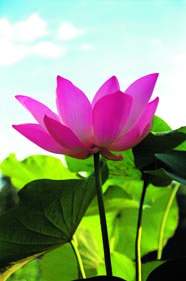| 主頁|Home > Buddhism > Newcomers > Why do some Buddhists exclude the five pungent vegetables from their diet? |
Why do some Buddhists exclude the five pungent vegetables from their diet? |
|
Our society is different from that of Buddha Shakyamuni's. If he were to re-appear in this world, I am sure the Buddha would encourage the use of garlic, simply because it ca be used to cure some diseases, especially lung disease.
In that garden, grew a large amount of garlic. Due to his isolation and boredom, he tried the garlic raw and discovered that he enjoyed the taste of it. Soon the garlic became more of a snack for him. Three months later, he was still alive, and months after that, he was becoming healthier and healthier. His family found it strange and thinking there had been a misdiagnosis, took him back to the hospital.
The doctor was astonished at what he saw and immediately gathered a group of specialists to investigate his patient?s case. Finally, they found out it was the garlic that cured the disease! From then on, many medicines for lung disease have been made with garlic. Regretfully, when Dr. Tang suggested that those students use garlic for treatment, his suggestion was not accepted. The students did not want to violate the precepts even though their illness was contagious. Therefore, precepts have to be flexible and to consider environmental conditions. Nowadays, almost everything we eat, such as meat, fish, and even vegetables, contains either chemicals or preservatives, which are harmful to us. In addition, we are seeing more and more people with diseases that have not previously existed.
Even the taste of meat is different now. Years ago, chicks and piglets were raised in the open, so they were happier and that affected the taste of the meat. Now animals are raised in a narrow space with no place to move. Do you think they are happy? I heard that in Taiwan, the piglets are injected with chemicals so they grow more quickly. Their life span is only six months and the chickens only live for six weeks! Even vegetables and grains are no exceptions to being contaminated. How could we not get sick?
Therefore, garlic is good for us, although it is harmful to our eyes when taken in large quantities.
(Adapted from http://www.buddhanet.net/pdf_file/artliv12.pdf) |
|
|


 Printable
Printable Some Buddhists who follow a strict diet not eat the five pungent vegetables: onions, garlic, chives, green onions and leeks. The Buddha said that these adversely affect those who are in the early stages of cultivation. If eaten cooked, they produce hormones. Eaten raw, they may affect the liver, leading one to become irritable and less able to concentrate. Please understand that this only happens if you eat them in large quantities. There is no problem if a moderate amount is used for cooking.
Some Buddhists who follow a strict diet not eat the five pungent vegetables: onions, garlic, chives, green onions and leeks. The Buddha said that these adversely affect those who are in the early stages of cultivation. If eaten cooked, they produce hormones. Eaten raw, they may affect the liver, leading one to become irritable and less able to concentrate. Please understand that this only happens if you eat them in large quantities. There is no problem if a moderate amount is used for cooking.